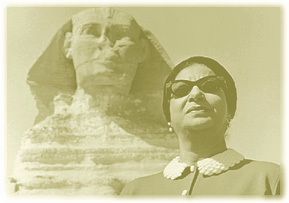Main Menu · Search ·Current Issue ·Contact ·Archives ·Centennial ·Letters to the Editor ·FAQs
| Books: Not Just for Children | Film: A Voice like Egypt |
| Open Book: An Unorthodox Union | Music: Baroque Diversions |
| Off the Shelf | Chapter & Verse |
 Preeminent emblems of their country. ANTOUNE ALBERT |
You've read the article. now see the documentary.
Egyptian singer Umm Kulthum was a legend in her own lifetime (see "Vita," July-August, page 46). She died in 1975, but her cassettes continue to outsell those of every other Arabic-speaking vocalist, and when filmmaker Michal Goldman '65 went to live in Cairo for a year in 1992, the voice she learned to recognize echoing through the city's hectic streets was that of Umm Kulthum.

"When I went to Egypt, I had no intention of making another film about music," explains Goldman, who had already produced and directed A Jumpin' Night in the Garden of Eden, the first feature-length documentary about klezmer music. "I went for the chance to live in an Arab country and study the language. But I think music refracts the wider circumstances and conditions of a society, including political conditions," and Umm Kulthum's music and story--a peasant girl whose singing made her an emblem of her country and her culture--persuaded Goldman to try a film about her. About six months into the project, a chance encounter with musicologist Virginia Danielson, who was at work on a biography of Umm Kulthum, gave Goldman a collaborator who spoke Arabic and could introduce her to individuals and archival sources with information about the singer. A grant from the Ford Foundation, whose office in Cairo realized the significance of Goldman's work, provided critical funding. In all, research, fundraising, filming, writing, and editing the English version of the film took four years; Goldman estimates that she is about two-thirds of the way through an Arabic version.
"The trickiest thing," she says, "was to figure out the point of entry. With the average American audience, you can't assume any common knowledge" of the subject. And so her documentary provides a lively primer on the singer and her country, tracing the evolution of twentieth-century Egypt from British protectorate to leader of the Arab world, and the development of its heroine from a rural child performer to musical film star to the diva whose radio concerts thrilled millions. Ordinary Egyptians, musicians, and intellectuals, including Nobel laureate Naguib Mahfouz, speak warmly of her influence on their lives; some sing favorite portions of her songs. Their voices, the soundtrack, the excerpts from movie musicals, and especially the scenes of Umm Kulthum's concerts offer a generous introduction to Arabic song.
Screenings of independent documentaries can be catch-as-catch-can, as Goldman, president of a group of independent filmmakers, well knows. Umm Kulthum, which premiered at the New York Film Festival last fall, has been shown in various venues nationally and internationally since then, including the Harvard Film Archives, where many would-be viewers had to be turned away at the door. (Another run is scheduled in November.) But this is a film worth keeping an eye out for. Missing Umm Kulthum is like missing a chance to meet the Elvis-cum-Eleanor Roosevelt of the Arab world.
~ Jean Martin